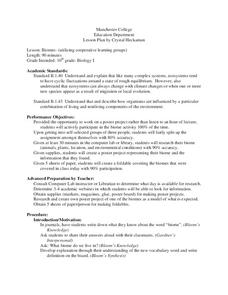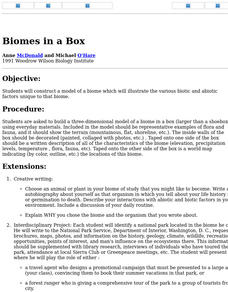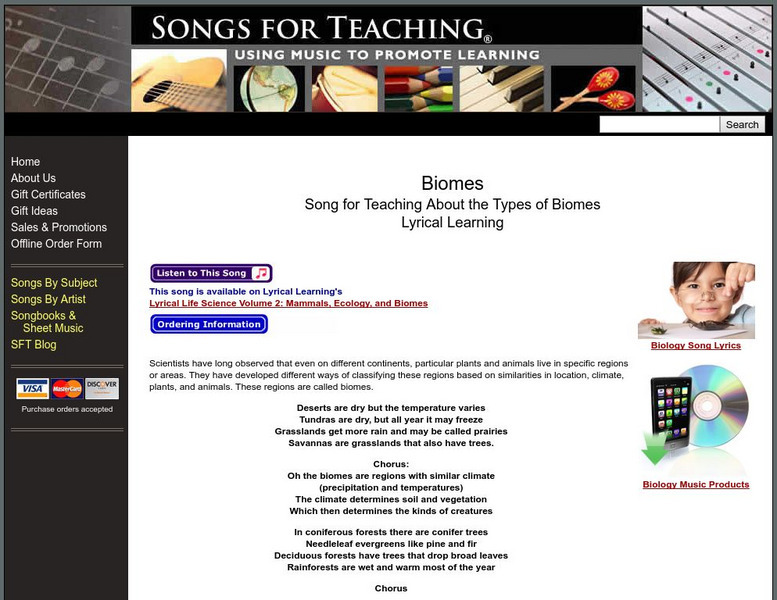Curated OER
Biomes and Plant Growth
Seventh graders design four biomes models and plant three types of seeds in them to observe growth. In groups for each type of biome, they predict the seeds' growth in each of the settings. Students follow the conditions on a biome chart...
Kentucky School for the Deaf
Levels of Organization within an Ecosystem
From tiny organisms to entire biomes, young scientists examine the interdependent relationships tying all living and non-living things together with this collection of ecology resources.
Columbus City Schools
Biome Basics with a Disastrous Twist
Bored with your current biome bag of tricks? This bundle is a bountiful bag of biome fun! Travel the globe with seventh graders and explore the biotic and abiotic factors that define our world's biomes. Then, introduce a little chaos to...
Intel
Biomes in Action
A STEM project-based learning lesson, number four in a series of 10, focuses on human impacts to biomes around the world. Groups work together as environmentalists to research a specific biome, investigating human impacts on it. From...
Curated OER
Exploring Regions of Our World
Examine how climate and landforms affect plants and animals that live in particular areas. Discover that these same factors affect peoples' homes, jobs, and recreational activities. Pupils research ecosystems and biomes, and then write...
Curated OER
Biomes
Tenth graders research locations of biomes and their barriers. In this biomes lesson, 10th graders examine location, environmental conditions, and species of plants and animals that live in the biome. Students take notes and create a...
California Academy of Science
Tropical Belt
Where in the world is the equator? Explore a world map with your class, coloring in oceans, continents, and rainforests while locating the three major lines of latitude: the equator, Tropic of Cancer, and Tropic of Capricorn. Discuss how...
Curated OER
Biomes in a Box
Students construct a three-dimensional model of a biome which illustrates the various biotic and abiotic factors unique to that biome. They use everday materials to represent the important characteristics of a particular biome and then...
Curated OER
Build the Taiga: Hands on Biome-Building
Students explore environmental awareness by completing a construction project. In this biomes lesson, students identify the different elements for life to thrive in an ecosystem. Students utilize a cardboard or wood box to create a biome...
University of South Carolina
Home Sweet Home
Fifth graders will research a biome (land or aquatic) and create a project (diorama, model or another idea of the student's choosing) which includes the geographic features of that biome as well as plants and animals found there and...
Curated OER
Constructing A Food Web
Students identify and explain the relationships within a food web. They use index cards to glue pictures of producers and consumers. On the back of the card, students name the organism, list the type of biome in which it is found.
Teach Engineering
Computer Simulation of the Sonoran Desert Community
See how changes in initial populations and parameters affect a biological community. Individuals use a special software program to simulate a desert community with five species. They adjust initial populations to see how the community...
University of Connecticut
Building Your Own Biosphere
On September 26, 1991, four women and four men entered the scientific experiment, Biosphere 2; the doors were sealed for two years in order to study the interactions of a biosphere. In the activity, scholars explore biospheres by...
Curated OER
Environments and Ecosystems
Fourth graders create and design a model biome. In this engineering activity, 4th graders observe the living and nonliving organisms interaction with the environment. They explain how engineers use their understanding of environment to...
Curated OER
First Contact
Sixth graders have an opportunity to enhance their computer skills by using Internet as a resource tool and a vehicle for global interaction with other students.
Curated OER
Habitat survival
Sixth graders study different environments and how the food chain affects the survival of different animals. In this environments lesson plan, 6th graders share the visuals which describe the characteristics of the environment that they...
Curated OER
A Walk in the Woods
Eighth graders observe and identify the different levels of the forest. In this forest zones lesson students observe, identify and name a variety of forest components and describe how humans impact the forest ecosystem.
Curated OER
Structure of Earth
Seventh graders study and make a model of the significant formations of the ocean floor. They examine images and illustration and apply their imagination while creating the model. They are challenged to complete further research as an...
Alabama Learning Exchange
Alex: At Home in a Biome
This lesson allows students to study and learn the names and characteristics of Earth's six major biomes. The biomes are introduced with a slideshow presentation. A paper-folding poster activity gives students the opportunity to...
PBS
Pbs Learning Media: Biome in a Baggie
This ZOOMSci video segment shows how to create self-contained environments and explore how plants grow under different conditions. [3:24]
Scholastic
Scholastic Explorers: Endangered Ecosystems
A great site with something for all grades. Do research on rainforests, follow field research on animals in Latin America, and show what you know through interactive assessments. Lots to see on this site which is a collaboration of...
PBS
Nh Pbs: Nature Works: Ecosystems
How would you define an ecosystem? Check out this educational resource to learn more about the living and nonliving parts of different ecosystems.
University of California
University of California Berkeley: Ecosystem Equilibrium
A simulator reviewing over the concepts of ecosystem equilibrium.
Songs for Teaching
Songs for Teaching: Types of Biomes
Doug Eldon performs this great song which tells about the different biomes and their characteristics. Great way to begin your unit on the biomes.

























